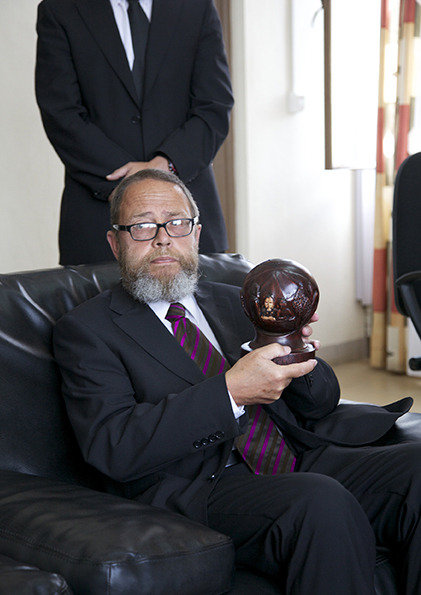Model Court
dal 8/5/2013 al 6/7/2013
Segnalato da
8/5/2013
Model Court
Gasworks Gallery, London
Resolution 978 HD. Using video, sound, drawing and installation, Court interrogate the production, dissemination and transmission of the law.

Gasworks presents an exhibition by London-based artists and researchers Model Court, an ongoing collaboration between Lawrence Abu Hamdan, Sidsel Meineche Hansen, Lorenzo Pezzani and Oliver Rees. Using video, sound, drawing and installation, Model Court interrogate the production, dissemination and transmission of the law, exploring how images and representations serve to complicate the production of legal space and the borders between nations.
The exhibition at Gasworks comprises a newly commissioned film and installation focusing on the recently concluded trial of François Bazaramba, a Rwandan national convicted of genocide by a small district court in the Finnish town of Porvoo. During the proceedings, Bazaramba was held in Finland and became a Skype participant in his own trial whilst the judges and prosecutors travelled to Rwanda and Tanzania to set up court. Owing to its use of telepresence technologies, the trial provides an unparalleled case study for understanding the relationship between media technologies and the principle of ‘universal jurisdiction’ – whereby states or organisations can claim criminal jurisdiction over accused subjects regardless of their nationality or where an alleged crime was committed. To what extent do emerging technologies displace the process of justice? How do images approximate bodies? And how do fibre optic cables and video conferencing software such as Skype produce unexpected political connections?
Written from the perspective of an unnamed technician responsible for the audio-visual setup of Bazaramba’s trial, Model Court’s film uses a semi-fictional narrative to explore the trial’s relationship to notions of aid, neo-colonialism and the production of history. Housed within an installation that engages with the court's official and unofficial photographic material, the film critically examines the complex and often dysfunctional audio-visual infrastructure used to bridge the jurisdictional divide.
Taken together, the film, installation and an accompanying series of events aim to interrogate this extraordinary yet naïve attempt by a regional Finnish court to intervene in a genocide that took place many miles and years away. The intention is not to present a history of Rwanda or to contest the culpability of Francois Bazaramba, but rather to tell a story about the transmission of one legal space into another, engaging with the cultural specificity of ‘international’ justice and its vision for Africa (so far the only continent to have been investigated by the International Criminal Court).
The exhibition will be accompanied by a programme of events, including contributions from filmmakers and media theorists. Further details will be announced soon.
The exhibition is generously supported by the Danish Arts Council, HIAP (Helsinki) and Forensic Architecture, Centre for Research Architecture, Goldsmiths, University of London.
Preview: thursday 9 May, 6.30-9pm
Gasworks Gallery
155 Vauxhall Street, London
Hours: Wed-Sun, 12-6pm or by appointment
Free Admission



